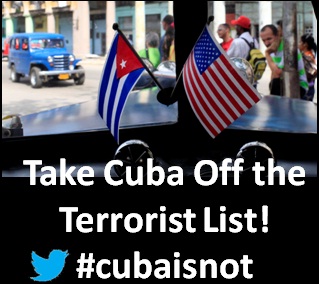
The U.S., Cuba and terrorism
By Robert Fantina
The United States State Department, in its infinite wisdom, has once again designated Cuba as a state sponsor of terrorism. The newest Country Report on Terrorism, issued on April 30, 2014, includes Cuba in a list of nations that “repeatedly provided support for acts of international terrorism”. The island country in the Caribbean has been so designated since 1982.One reads about the U.S. calling any other nation a ‘sponsor of terrorism’ in shocked disbelief. That the U.S., the greatest purveyor of terrorism on the planet, has the audicity to accuse any other nation of sponsoring terrorism is beyond all credibility.
Just since the beginning of the new millennium, the U.S. has unleashed horrific terrorism on the people of Iraq and Afghanistan, resulting in the deaths of at least hundreds of thousands of men, women and children, and the displacement of millions, and is currently sending drones to Yemen and other nations, ostensibly to kill ‘terrorists’, but resulting in the deaths of thousands of innocent people. Is this not terrorism?
And what of the U.S.’s continued and unwavering financial support of Israeli terrorism against the Palestinians? Not only does the U.S. finance that apartheid regime, it blocks any attempt by the international community to put a halt to it.
So 1982 is the year that the U.S. first decided that Cuba was a state sponsor of terrorism. This, despite U.S. antagonism toward that country since 1959, when the repressive and widely hated, U.S.-supported regime of Fulgencio Batista was overthrown by a popular resistance movement, led by the young leftist, Fidel Castro. At that time, the U.S. controlled 80% of Cuban utilities, 90% of its mines and cattle ranches, and nearly all of its oil refineries. No wonder Mr. Castro has incurred the wrath of the U.S. since then: when the American bottom line is threatened, no efforts are too great to protect it.
And what has the U.S., that shining beacon of peace, freedom and democracy, been doing on the world stage since 1982, when it first signaled out Cuba as a terrorist state? It has either invaded, or covertly or overtly worked for the overthrow of the governments of the following countries, sometimes on multiple occasions, and sometimes constantly:
Cuba
Nicaragua
Angola
Philippines
Iraq
Iran
Venezuela
Palestine
Afghanistan
Somalia
Haiti
If one were to go back just to the middle of the twentieth century, these countries could be added to the list:
Syria
Guatemala
Tibet
Indonesia
Democratic Republic of the Congo
South Vietnam
Brazil
Ghana
Chile
Turkey
Poland
Korea
El Salvador
Grenada
And what of ‘enhanced interrogation techniques’, including waterboarding, which the United Nations and every civilized country in the world, except for the U.S., condemns? By any but U.S. standards, these are acts of terrorism.
And while we’re talking about Cuba, let’s not forget Guantanamo, the U.S.’s, Cuban-based torture chamber. And the U.S. policy of ‘extraordinary rendition’, the practice of kidnapping suspected terrorists and sending them to foreign countries where prohibitions against torture don’t exist, can only be seen as terrorism.
So while the U.S. wages war, tortures political prisoners, holds prisoners for years without any concept of due process, destabilizes democratically-elected governments which displease it, and finances governments with long records of the most shocking human rights abuses, it actually has the nerve to accuse another country of supporting terrorism.
Cuban response to this designation is milder than one might expect. A statement from that country’s foreign ministry said that Cuba “…energetically rejects the manipulation of a matter as sensitive as international terrorism by turning it into an instrument of policy against Cuba and it demands that our country be definitively excluded from this spurious, unilateral and arbitrary list.”
So what are the specific reasons the U.S. has for continuing to designate Cuba a sponsor of terrorism? It hardly matters, considering the U.S.’s own ongoing, horrific terrorist activities around the globe, but let’s note them anyway.
* Past support for the Basque separatist group ETA (Euskadi Ta Askatasuna ( Basque Homeland and Freedom)), and
* Support for Colombia’s FARC (Fuerzas Armadas Revolucionarias de Colombia (Revolutionary Armed Forces of Colombia) rebels.
Yet the report concedes that Cuban ties to ETA ‘have become more distant’, and it points out that Cuba is hosting talks between the Colombian government and the FARC in Havana.
There are, of course, opposing views for why the U.S. actually has so designated Cuba:
Said Mauricio Claver-Carone, of the U.S.-Cuba Democracy PAC, an influential lobby group in Washington: Cuba “fails to meet the statutory criteria for being removed” (whatever that is).
Alana Tummino, director of policy at the Americas Society/Council for the Americas in New York, had a different view: “Sadly, unless the State Department has more evidence than it’s providing, it appears that political motivations have once again driven this determination.”
Can there be any doubt that political motivations are, in fact, behind the U.S.’s continuation of a policy that makes no logical sense? For nearly sixty years, the U.S. has embargoed, boycotted, sanctioned, blockaded and invaded Cuba, all because of ongoing resentment against the takeover by the government by Cubans from the Americans. The electoral vote in Florida is usually vital in presidential elections, and the importance of the Cuban-American voting bloc, although diminishing, is still worth courting. So such considerations as human rights, justice and statesmanship have no role in policy-making, when the goal is always re-election.
One looks in vain for any substantive change to U.S. policy towards Cuba.
Robert Fantina’s latest book is Empire, Racism and Genocide: a History of US Foreign Policy (Red Dill Press).
(From Counterpunch)

